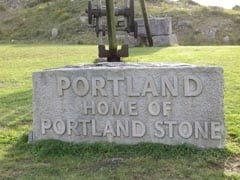Stone sources : Portland Stone Firms
With new machinery in its quarries, its newly extended factory and employing 60 people – the most for many years – Portland Stone Firms is benefitting from the economic resilience of London and the pull of the internet.
Portland Stone Firms, which quarries the famous Portland limestone, is enjoying its highest level of sales since the quarries it operates on the Dorset island were bought from Hanson in 2004. “We have never been so busy,” says Neil Fuller, who was Works Manager before the sale and is now a Director.
The high level of work has brought a lot of jobs to the island and Portland Stone Firms is currently employing more than 60 people – also a record for as long as Neil Fuller can remember. And it has invested £800,000 in Benetti wire saws in the quarries and an extended factory to house four Benetti primary saws, a big Omag CNC workcentre, and a new Gisbert tile line (which you can see working on YouTube by searching for NaturalStone01) that will mean old stock can be converted into attractively priced paving.
The on-going high level of activity has come from projects such as the ME hotel in London, 30 North Audley Street with Bishop Developments, and Holborn Viaduct, where the specialist stone contractor is Stirling Stone and there is so much masonry to be carved that some of it has had to be given to Spectrum Stone, although, of course, the whole project uses Portland Stone Firms’ Perryfield Whitbed.
Spectrum was established by former Rattee & Kett masons in Newmarket in 2006 and Neil Fuller, as a former Rattee & Kett man himself, is particularly comfortable with them taking on some of the carving work. Holborn Viaduct will have given Portland Stone Firms 10,000 man-hours of work by the time it is finished and will have used nearly 200m3 of stone.
At the same time, the quarry company is supplying its stone to Stirling Stone on a smaller hotel project in London at Carlisle Street and to a project at DeVere Gardens in Kensington where Grants of Shoreditch is the specialist stone contractor. There, Portland Stone Firms is supplying Grants’ own precast company.
“When you get two or three large projects under your belt the workflow becomes more stable and predictable,’ says Neil.
But these main London projects, which once accounted for 90% of the production of Portland stone, are now supplemented by a larger number of relatively smaller projects around the country, which helps smooth out the peaks and troughs of production.
These smaller projects, which include a good proportion of new-build modern mansions, now account for as much as 30% of Portland Stone Firms’ business and Neil is happy for the proportion to continue to increase, especially as the orders tend to come from companies that do not hold accounts and therefore pay up-front. These are typically £50-60,000 projects and they often come through the stonefirms.com website. “We are getting half-a-dozen enquiries a day,” says Neil. “I almost wonder sometimes if people with money haven’t got much to invest in at the moment so are spending it on houses.”
Portland Stone Firms’ versions of the famous limestone come from three quarries – and might also come from a fourth behind the World Heritage Site of the Jurassic Coast had the mineral planners of Dorset County Council not restricted the company’s access, for which it is currently stepping up its claim for compensation by referring it to the Lands Tribunal.
The active quarries are Coombefield, Perryfield and Broadcroft. The stone from Coombefield is going to DeVere Gardens but the Whitbed from this quarry is coming to an end. Portland Stone Firms is exploring the possibility of extracting the Basebed below but when the reserves are exhausted, the quarry will be restored and holiday lodges sited there as part of a Masterplan that also includes building 80 houses, a 68-bed retirement home and a 450-plot caravan park on some of the 600acres that came with the business when it was bought from Hanson in 2004.
Perryfield and Broadcroft both have up to 40 years worth of reserves. Perryfield is a particularly clean stone, with the Whitbed almost as clean and shell free as the Basebed, although it is available in bed heights of 1.2m rather than the 600mm of the Basebed. Currently, architects like the larger sizes, even though it is more expensive than smaller sizes, and Portland Stone Firms can sell as much of the Perryfield stones as the company can produce.
Broadcroft is less consistent, ranging from clean to shelly, which is seldom what customers want. So Portland Stone Firms bought the two Benetti wire saws plus a new generator and Komatsu 500 as a unit to side off the 4,000m3 of stock already extracted in Broadcroft. That has enabled the stone to be graded as clean, shelly and more shelly in order to supply a more consistent product at a price advantage over the Perryfield, which Neil says has increased its popularity. After Broadcroft, the unit will move into the other quarries to recover another 12,000m3 of old stock in them.
The future for Portland Stone Firms is looking bright and Geoff Smith, who heads Portland Stone Firms, puts the blame for the business’ difficulties two years ago squarely on the sudden change of attitude of its bank. “The bank didn’t wish to recognise the underlying asset value of the business,” says Geoff. It withdrew funding half way through a loan period after the business had sold its main workshop to be developed into a Tesco store and was moving to a new factory.
“We had a full order book, had never had an overdraft and had a substantial sum on deposit,” complains Geoff. “Then Bob Diamond chose to limit retail construction banking and we – with others – got caught up in that decision.”

